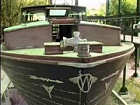 Yesterday OFAC issued a new set of designations of individuals under the sanctions regime for the Democratic Republic of the Congo. In that designation, OFAC amended the designation of Viktor Anatolijevitch Bout to include the DRC Sanctions as the reason for designation in addition to the Liberia sanctions under which Bout had already been designated.
Yesterday OFAC issued a new set of designations of individuals under the sanctions regime for the Democratic Republic of the Congo. In that designation, OFAC amended the designation of Viktor Anatolijevitch Bout to include the DRC Sanctions as the reason for designation in addition to the Liberia sanctions under which Bout had already been designated.
Mr. Bout has a more interesting story than most SDNs. Starting in 1992, Bout built a network of aircraft that he used to carry everything from guns to gladiolas. It was the former product, and not the latter, which got Mr. Bout into hot water. There appeared to be substantial evidence that bout was running weapons to the Northern Alliance in Afghanistan, the Taliban, Angola and the UNITA rebels that sought to overthrow Angola, Charles Taylor of Liberia and Col. Muammar el-Qaddafi.
After the U.S. incursion into Iraq, Mr. Bout also began to provide services to the U.S. military and its contractors. Shortly after the fall of Baghdad, the United States coordinated a massive airlift of goods and supplies into Iraq. According to a just-published article in Foreign Policy by Douglas Farah and Stephen Braun, Bout played a role in that airlift:
But to their embarrassment, U.S. officials later learned that many of the Russian planes were operated by companies and crews working for Viktor Bout. His planes were flying Federal Express shipments for the U.S. Air Force, tents for the U.S. Army, and oil field equipment and personnel for KBR, a Halliburton subsidiary. In the months that followed, Bout’s flagship firm flew hundreds of sorties in and out of Baghdad, earning millions of dollars from U.S. taxpayers.
Bout’s involvement in the Iraq airlift caused the U.S. to delay impositions of sanctions on Bout. OFAC continued to squabble with the Pentagon which claimed that it had no obligation to scrutinize second-tier subcontractors such as Bout, who was ferrying items for KBR. Finally in April 2005, sanctions were imposed on Bout for his dealings with the Charles Taylor regime of Liberia. UN Sanctions followed in November 2005. Even so, there appears to be evidence that Bout-operated planes have continued to ferry goods into Baghdad’s airport, at least according to Farah and Braun.
The purpose of designating Bout under a second sanctions regime at this point seems unclear. Perhaps OFAC hopes that this might double the penalty for dealing with Bout, although the legal basis for such a supposition is doubtful. More likely it may be to preserve a second basis for sanctions against Bout if the Liberia sanctions should be ended for some reason.
In all events, Mr. Bout is alive and well in Moscow. He has always claimed that he has no idea, absolutely no idea whatsoever, what was in those packages he delivered throughout the world to rebels and dictators. He continues to reside in a luxury apartment complex and to carry on his business undeterred. As Messrs. Farah and Braun state:
Conceding their difficult straits, U.S. officials admit that there is no clear evidence that Bout’s air fleet has been diminished or his activities slackened as a result of the sanctions. “You never can say with 100 percent certainty that he is gone,†says Zarate—who is now President George W. Bush’s chief counterterror deputy at the NSC. “He is very, very good at doing his business.†The Europeans find it equally hard. “He doesn’t go away. He just keeps changing his aircraft and registrations, hoping that he will outlast the interest in following him,†says a European military intelligence source. “So far, he is right.â€
 OFAC released this week its latest civil penalties information which reported two fines, one against a company and one against an individual.
OFAC released this week its latest civil penalties information which reported two fines, one against a company and one against an individual.
 Posted by
Posted by  Category:
Category: 

 It would appear that Iran’s nascent efforts to cook up a few nuclear bombs hasn’t been a tremendous boon for its tourism industry. So, Iran has
It would appear that Iran’s nascent efforts to cook up a few nuclear bombs hasn’t been a tremendous boon for its tourism industry. So, Iran has  Yesterday OFAC
Yesterday OFAC  Since not much is in the news today export-wise, other than OFAC’s
Since not much is in the news today export-wise, other than OFAC’s  According to a
According to a 

